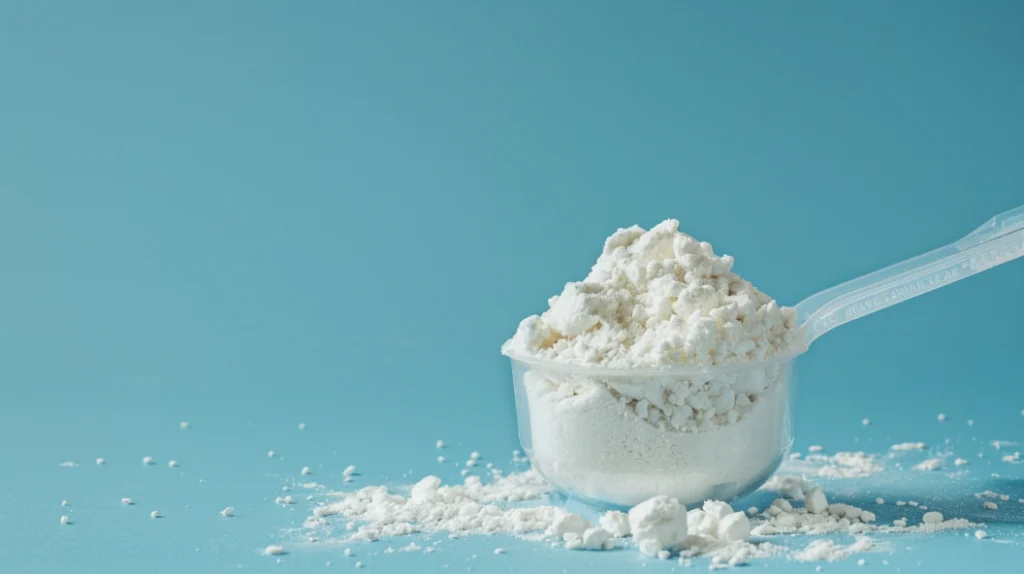Creatine is one of the most popular and well-researched sports supplements on the market. Yet despite the wealth of scientific evidence supporting its benefits for athletic performance and muscle growth, some people still wonder – is creatine a steroid?
Let’s dive into what the research says to definitively answer this common question.

What is creatine?
Creatine is a natural compound produced in the body from amino acids. It’s also found in protein-rich foods like meat, fish, and eggs.
In the body, creatine is converted into phosphocreatine and stored in the muscles, where it’s used to produce the high-energy molecule ATP during intense exercise.
As a supplement, creatine is most often used to improve exercise performance and increase muscle mass in athletes and older adults.
What are steroids?
Anabolic steroids are synthetic substances related to testosterone, the male sex hormone. They promote the growth of skeletal muscle and increase male characteristics.
Some athletes take anabolic steroids to gain an unfair advantage, but these substances can have serious side effects ranging from acne to heart problems to increased risk of injury.
Anabolic steroids are illegal and banned by most sports organizations.
So, is creatine a steroid?
The short answer is no, creatine is not a steroid. Creatine and anabolic steroids are very different substances.Here are the key differences between creatine and steroids:
- Chemical structure: Creatine is a combination of three amino acids, while steroids are synthetic substances based on testosterone.
- Mechanism of action: Creatine improves athletic performance by increasing the muscles’ phosphocreatine stores, while anabolic steroids work by promoting muscle protein synthesis.
- Safety: Creatine has been extensively studied and is considered safe for most people (teens and kids), while anabolic steroids can cause many adverse health effects.
- Legality: Creatine is legal and is not banned by any sports organizations, while steroids are illegal without a prescription and are prohibited in most sports.
So in summary, creatine and steroids are completely different compounds. Creatine is a safe, well-studied, and legal supplement, while steroids are unsafe, illegal, and banned in sports.
Is creatine safe?
Creatine is one of the most well-researched supplements and has been consistently shown to be safe and well-tolerated.
The International Society of Sports Nutrition states that creatine is extremely safe also for teens and children and is one of the most beneficial sports supplements available.
Studies have looked at the effects of both short-term, high-dose creatine loading and long-term creatine supplementation (up to 5 years). No significant adverse effects have been found.
Creatine myths and misconceptions
Despite the clear evidence that creatine is not a steroid, the myth persists. Here are some other common misconceptions about creatine supplementation:
Myth #1: Creatine causes kidney damage
Fact: No scientific evidence shows that creatine harms the kidneys in healthy individuals. This myth may stem from the slight increase in creatinine levels, a marker of kidney function, during creatine loading.
Myth #2: Creatine causes dehydration and cramps
Fact: Studies have found no link between creatine and dehydration or cramps. In fact, creatine may actually have a protective effect by increasing total body water.
Myth #3: You don’t need creatine if you eat a high-protein diet.
Fact: While you do get some creatine from protein-rich foods, it’s difficult to significantly increase muscle creatine stores through diet alone. Supplementation is a more efficient way to reap the performance benefits.
The bottom line on creatine
Creatine is one of the most well-researched sports supplements available, with hundreds of studies backing its effectiveness for improving high-intensity exercise performance.
When used properly, creatine offers benefits with little to no risk. The International Society of Sports Nutrition has even called creatine the most effective nutritional supplement for increasing high-intensity exercise capacity and lean body mass.
So if you’re looking for an edge in your training, don’t let the myths and misinformation about creatine hold you back. Creatine is absolutely, unequivocally NOT a steroid – and that’s a scientific fact.
As always, consult with your doctor before starting any new supplement regimen. But for most healthy individuals, creatine is a safe and legal way to help maximize your muscle and strength gains.
FAQs about creatine
To conclude, let’s answer some of the most frequently asked questions about creatine supplementation:
What is the best form of creatine?
Creatine monohydrate is the most studied and most recommended form. It’s also the most cost-effective.
Does creatine cause kidney damage or dysfunction?
No. Creatine does not harm the kidneys in healthy individuals, even at high doses. Long-term studies have found no adverse effects on kidney function.
What are the best food sources of creatine?
Beef, pork, tuna, salmon, and cod are all good sources of dietary creatine. However, cooking degrades most of the creatine in foods. To get the 3-5 gram daily dose shown to be beneficial, a creatine supplement is recommended.
Does creatine cause weight gain?
You may gain 1-3 pounds in the first week of taking creatine due to increased water retention in the muscles. This is not fat gain. As you continue to train, creatine can help increase lean muscle mass.



